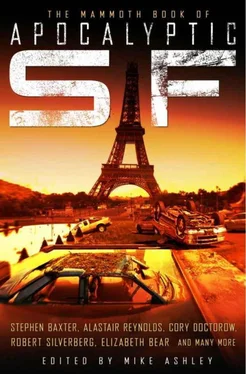“Look at that!” Arne raised his arm to point ahead. “I think they do remember us.”
A woman in a long white gown gestured sternly to hush him, and the pavement bore us on toward a tall needle that stabbed into the sky at the end of the avenue. A thin crescent at its point shone like a bright new Moon.
Statues, needle, crescent, they were all bright silver. A bell began to boom somewhere ahead, slow deep-toned notes like far thunder. The murmur of voices ceased. All eyes lifted toward the crescent. I saw Pepe cross himself.
“A ceremonial,” he whispered. “I think they worship the Moon.”
I heard him counting under his breath as the bell pealed. “Twenty-nine,” he murmured. “The lunar month.”
The soundless pavement took us on till he started and jogged my arm again, pointing at the towering figure just ahead. More than magnificent, a blinding silver dazzle in the slanting morning sun, it must have been a hundred feet tall. Shading my eyes, I blinked and looked and blinked again.
It was my father. In the same jacket and necktie his holo image had worn when it spoke from the tank, flourishing the same tobacco pipe he had waved to punctuate his lectures. The pipe, I thought, could be only a magic symbol now; DeFalco had saved no tobacco seed.
Those nearest the statue dropped to their knees, kissing their lunar pendants. Eyes lifted, they breathed their prayers and rose again as we moved on toward the next monumental figure, even taller than my father’s. It was Pepe himself, in the flight jacket and cap his clone father had worn to the Moon, one gigantic arm lifted as if to beckon us on toward the needle and the crescent. People pressed toward it, kneeling to kiss heir pendants and pray.
“He never dreamed.” His own eyes lifted, Pepe shook his head in awe. “Never dreamed that he might become a god.”
Tanya came next, taller still, splendid in the sunlit shimmer of her lab jacket, raising an enormous test tube toward the tower. Arne next, waving his rock-hunter’s hammer. Finally Dian, the tallest, holding a silver book. I heard our actual Dian gasp when she read the title cut into the metal.
The Poems of Emily Dickinson.
Below the needle and the crescent, the pavement carried us into a vast open circle ringed with great silver columns. Slowing it crowded us together. At a single thunderous peal, people stood still, gazing up at a balcony high on the face of the spire.
A tiny-seeming man robed in bright silver appeared there, arms raised high. The bell pealed again, echoes rolling from the columns. His voice thundered, louder than the bell. The worshipers sang an answer, a slow and solemn chant. He spoke again, and Pepe gripped my arm.
“English!” he whispered. “A queer accent, but it’s got to be English!”
The speaker stopped, arms still lifted toward the sky. The bell pealed, its deep reverberations dying slowly into silence. People around us fell to their knees, faces raised to the crescent. We knelt with them, all of us but Arne. He stalked on fonvard, bullhorn high.
“Hear this!” he bawled. “Now hear this!”
People around him hissed in protest, but he strode on toward the tower.
“We are your gods!” He paused to let his voice roll back from the columns. “We live on the Moon. We have returned—”
A tall woman in a silver robe came off her knees to shout at him, waving a silver baton. He stopped to gesture at Dian and the rest of us.
“Look!” he shouted. “You must know us-”
She waved the baton at him. His voice choked off. Gasping for breath, he dropped the bullhorn and crumpled to the pavement. The woman swung the baton toward us. Dian rose, waving her book and declaiming Dickinson: This is my letter to the world That never wrote to me— Dimly, I recall the desperate quaver in her voice, the hushed outrage on the woman’s face. The baton swept us. A puff of mist chilled and stung my cheek. The pavement seemed to tilt, and I must have fallen.
For a long time I thought I was back at Tycho Station, confined to the bed in our tiny clinic. A robot stood over me, as patiently motionless as any robot. A fan hummed softly. The air was warm, with an odd fresh scent. I felt a sense of groggy comfort till a numb stiffness on my cheek brought recollection back: that avenue of gigantic silver figures, the stern-faced woman in her silver robe, the icy mist from her silver baton.
Shocked wide awake, I tried to get off the bed and found no strength. The robot tipped its lenses, bent to catch my wrist and take my pulse. I saw the difference then; its slick plastic body was the pale blue of the walls, though it had the half-human shape of our robots on the Moon.
Earth gravity turned me giddy. The robot eased me back to the bed and seemed to listen when I spoke, though its answer was nothing I could understand. When I stirred again, it helped me to a chair and left the room to bring a human physician, a lean dark man who wore a silver crescent on a neat white jacket. Briskly efficient, he listened at my heart, felt my belly, shook his head at what I tried to say, and turned to leave the room.
“My friends?” I shouted at him. “Where are they?”
He shrugged and walked out. The robot stood watching till I felt able to stand and then took my arm to guide me outside, into a circular garden ringed with a circular building. Its lenses followed intently while I walked gravel paths through strange plants that edged the air with scents new to me. The other doors, I thought, might be hiding my companions, but it caught my arm when I tried to knock. When I persisted, it drew a little silver baton clipped to its waist and beckoned me silently back into the room.
Under its guard, I was treated well enough. Although my words seemed to mean nothing, it nodded when I rubbed my lips and my belly, and brought a tray of food: fruits that we have never grown on the Moon, a plate of crisp brown nut-flavored cakes, a glass of very good wine. I ate with a sudden appetite.
Silent most of the time, now and then it burst into speech. Clearly, it had questions. So did I, desperate questions about these remote children of ours and what they might do with us. It listened blankly when I spoke and locked the door when it left the room, with no hint of any answers.
Haunted by our images along that monumental avenue, I slept badly that night, dreaming that they were lumbering in hot pursuit while we fled across a lifeless landscape pitted with deep craters those black insects had eaten into the planet.
Terror chilled me. Did these people want to sacrifice us in that sacred circle? Drown us in the Nile? Feed us to the insects? Freeze us into silver metal and stand us on guard against the next invasion of heretic clones? I woke up shivering, afraid to know.
Next morning the robot brought an odd-looking machine, and admitted a slim, quick little woman who looked a little like Dian, though she was wrinkled and dark from a sun that never shone below our Tycho dome. Perhaps a sort of nun, she wore a tall silver turban and fingered a silver Moon pendant. She set up the machine to project words on the wall.
The moon is distant from the sea, And yet with amber hands She leads him, docile as a boy, Along appointed sands.
Familiar words. I’d heard Dian recite them in a tone of adoration, though I was never sure exactly what they meant. They became stranger now, as the woman chanted them like a prayer. She repeated them two or three times in the same solemn tones and then read them more slowly, watching through dark-rimmed glasses to see my response, until at last I could nod to a spark of recognition. Vowel sounds had simply shifted. Moon was mahan, see was say.
She came back again and again, using her machine to teach me like a child. Even when the sounds became familiar, everything else was baffling: plants and animals, clothing and tools, maps of the world and the symbols of math. Yet at last I was able to ask about my companions.
Читать дальше












